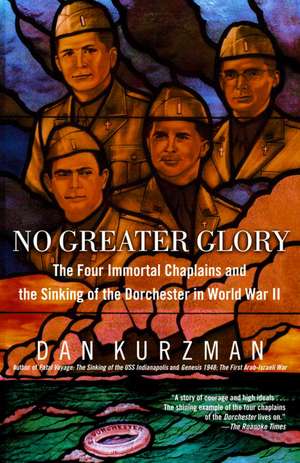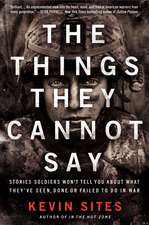No Greater Glory: The Four Immortal Chaplains and the Sinking of the Dorchester in World War II
Autor Dan Kurzmanen Limba Engleză Paperback – 31 iul 2005
As water gushed through a hole made by a German torpedo, four chaplains—members of different faiths but linked by bonds of friendship and devotion—moved quietly among the men onboard. Preaching bravery, the chaplains distributed life jackets, including their own. In the end, these four men went down with the ship, their arms linked in spiritual solidarity, their voices raised in prayer. In this spellbinding narrative, award-winning author and journalist Dan Kurzman tells the story of these heroes and the faith—in God and in country—that they shared.
They were about as different as four American clergymen could be. George Lansing Fox (Methodist), wounded and decorated in World War I, loved his family and his Vermont congregation—yet he re-enlisted as soon as he heard about Pearl Harbor. Rabbi Alex Goode was an athlete, an intellectual, and an adoring new father—yet he too knew, the day Pearl Harbor was bombed, that he would serve. Clark Poling (Dutch Reformed), the son a famous radio evangelist, left for war begging his father to pray that he would never be a coward. Father John Washington (Catholic), a scrappy Irish street fighter, had dedicated himself to the church after a childhood brush with death. Chance brought the chaplains together at a Massachusetts training camp, but each was convinced that God had a reason for placing them together aboard the Dorchester.
Drawing on extensive interviews with the chaplains’ families and the crews of both the Dorchester and the German submarine that fired the fatal torpedo, Kurzman re-creates the intimate circumstances and great historic events that culminated in that terrible night. The final hours unfold with the electrifying clarity of nightmare—the chaplains taking charge of the dwindling supply of life jackets, the panic of the crew, the overcrowded lifeboats, the prayers that ring out over the chaos, and the tight circle that the four chaplains form as the inevitable draws near.
In No Greater Glory, Dan Kurzman tells how four extraordinary men left their mark on a single night of war—and forever changed the lives of those they saved. Riveting and inspiring, this is a true story of heroism, of goodness in the face of disaster, and of faith that transfigures even the horror of war.
From the Hardcover edition.
Preț: 114.60 lei
Nou
Puncte Express: 172
Preț estimativ în valută:
21.93€ • 23.45$ • 18.28£
21.93€ • 23.45$ • 18.28£
Carte disponibilă
Livrare economică 27 martie-10 aprilie
Preluare comenzi: 021 569.72.76
Specificații
ISBN-13: 9780812966091
ISBN-10: 0812966090
Pagini: 288
Ilustrații: 16-PP PHOTO INSERT; MAP
Dimensiuni: 132 x 203 x 13 mm
Greutate: 0.3 kg
Editura: Random House Trade
ISBN-10: 0812966090
Pagini: 288
Ilustrații: 16-PP PHOTO INSERT; MAP
Dimensiuni: 132 x 203 x 13 mm
Greutate: 0.3 kg
Editura: Random House Trade
Notă biografică
DAN KURZMAN, a former foreign correspondent for The Washington Post, is the author of fifteen previous books and the winner of five major literary and journalistic awards. His books include Fatal Voyage: The Sinking of the USS Indianapolis; Left to Die: The Tragedy of the USS Juneau; and Genesis 1948: The First Arab-Israeli War. He lives in North Bergen, New Jersey.
From the Hardcover edition.
From the Hardcover edition.
Extras
Chapter 1
The Suicide Ship
1
“Sergeant Warish! Sergeant Warish! Wake up!”
First Sergeant Michael Warish did not respond to the pleas of the shadowy figure hovering over his ravaged body, which, shortly before dawn on February 4, 1943, lay crumpled on a stretcher spread on the snow-blanketed dock in Narsarssuak, a port town near the southern tip of Greenland. He had just been carried from the Coast Guard cutter Comanche, together with scores of other wounded and dying men who were awaiting an ambulance from a nearby hospital.
They had been pulled out of the freezing waters of the North Atlantic about one hundred miles south of Greenland after a German U-boat torpedoed the USAT Dorchester, a troop carrier crammed with nine hundred men, most of whom died aboard the ship when it went down or froze to death in the icy currents. The sinking was one of the worst sea disasters in World War II.
Finally, the figure crouching over Michael shook him by the shoulders and saw his eyelids flutter, then open slightly. Michael glimpsed the dark form of someone etched against the slightly lighter sky.
“Where am I?” he muttered.
“Greenland,” replied the fuzzy image. “How ya doin’?”
Michael didn’t recognize the commander of the United States Army unit he was returning to after a leave at home. Greenland? Was that another name for heaven? Was he alive? Michael wasn’t sure. He couldn’t even remember his name, who he was. But he vaguely recalled stepping off the sinking ship into a black, foaming, ice-strewn infinity. Then the agonized cry that had resonated in the night and lingered in the frosty air, a cry that now echoed mercilessly in his mind: “Mother! Mother! Please save me!”
And gradually all those hundreds of little red lights that had speckled the ocean began flickering again. Almost like Christmas, he thought. Except that these lights reflected not a merry affirmation of life but a cynical celebration of death. Attached to life jackets so that the glitter could attract rescuers, they marked the graves of men like himself who were either dead or dying. No one, he had heard, could live more than twenty minutes in freezing water, and there was no time, he was sure, for rescue ships to come.
As Michael bounced in his life jacket from wave to wave, he resigned himself to death and suddenly, to his surprise, felt relaxed. He thought about his mother and his deceased sister, whom he would soon join, and about his fourth-grade teacher, who had given him a cookie every day. Yes, he was dying, but he could feel nothing—other than the burning in his throat from the salt and oil he swallowed as he drifted through the slick polluting the sea around the stricken ship. His body, nearly frozen, was numb. He simply felt sleepy, but once he fell asleep, he knew, he would not wake. Actually, an easy way to die.
Yet instinct forced him to refrain from shutting his eyes as long as possible, at least until the full twenty minutes medically allotted to life in the icy ocean was up. . . . What happened after that? He didn’t remember. He must have died . . . and so, it seemed, he was in heaven . . .
Some hours later, Michael, conscious but with his mind still muddled, was carried along with other survivors to an ambulance that sped to a nearby barracks serving as a hospital, where doctors put him to bed and treated his leg, head, and back wounds. Soon, he drifted again into a deep sleep, though this time he would wake in the morning without prodding. He could remember his name now, and he realized that Greenland, where he was based, was not heaven.
Though the numbness was partially gone and the pain from his wounds was intensifying, Michael got up, deeply depressed, and, ignoring the advice of his doctors, hobbled to the barracks housing his unit a few hundred yards away to see his old comrades. Perhaps they could help rid him of his depression and put the horrors he had endured behind him.
But the reunion didn’t work. His friends greeted him with joy, but also with endless questions about the disaster. In desperation, Michael locked himself in the barracks boiler room and sat on a stool. He wanted to ease his pain in the warmth—and to be alone; to drain his soul of the torment inflicted by fragmented memory, to still the echo of that maddening cry for help. But he knew this was impossible without first unblocking all the horrific details festering in the inner recesses of his mind.
Gradually, Michael relived the catastrophe. He could see himself getting wounded in the explosion, trapped in his quarters, then escaping and crawling to the deck, where, as the ship was going down, he witnessed a scene of an almost biblical nature. He had never been religious, but he felt strangely exalted now in the presence of four familiar figures in the tableau. Unable to imagine a more sacred moment, he began mumbling the half-forgotten words of the Lord’s Prayer and, climbing over the railing of the swiftly sinking ship, stepped into the arctic sea.
2
Michael Warish had not been eager to leave home after his furlough and return to Greenland, with its icy weather, its bare, snow-covered fields, its overwhelming desolation and dreariness of life. But worst of all, as a North Atlantic veteran he knew the dangers lurking along the route to Greenland. German U-boats in so-called wolf packs infested the Strait of Belle Isle, aptly referred to as Torpedo Junction, between Labrador and Newfoundland Island. They had already sunk scores of Allied ships in these swirling waters.
Still, Michael, an eleven-year army enlistee who was now a member of an artillery company assigned to protect bases and construction crews in Greenland, was consoled by the thought that he would be rejoining his buddies, with whom he had tightly bonded in seeking to ease the bleakness of almost total isolation. Besides, he was scheduled to be back in the United States soon. He had first been sent to this vast arctic desert, the world’s largest island, in 1941, and this was his sixth trip there. He had come home on furlough this time to attend his sister’s funeral, and now, two weeks later, he was returning, one of the few passengers on the Dorchester who was sure where it was headed.
On the afternoon of January 22, 1943, Michael stepped off the train from Camp Miles Standish in Taunton, Massachusetts, with a “casual,” or temporary, company of about three hundred other men, mostly green recruits, and onto Pier 11 in Staten Island, New York. Some who had never sailed on a large ship before gaped at the sight of the Dorchester. Despite its rather shabby, gray exterior, it had the sleek and graceful lines of a luxury liner rather than the forbidding, fortlike appearance of a warship. The men were excited as they mounted the gangplank.
In fact, the Dorchester, 367 feet long and weighing a relatively light 5,680 tons, had been launched in 1926 as a luxury passenger ship by the Merchant and Miners Transportation Company of Baltimore, Maryland. It could provide 314 vacationers with comfortable cabins, suites, and public rooms that advertisements claimed matched the magnificence of the “finest hotel.” It was alive every night with laughter, bright lights, and soothing dance music.
Also aboard was a large, dazzling casino, where patrons could gamble as the ship cruised up the East Coast from Florida to New York, with stops in between at various ports. But in March 1942, with the war under way, the vessel metamorphosed into a troop carrier and the slot machines gave way to cannons. German U-boats were sinking ship after Allied ship, and the United States, caught unprepared for a full-scale sea war, had to bring every available vessel into service, no matter how old or dilapidated.
Soon bases were sprouting in the white, windy, arctic wilderness of Greenland as American engineers and military personnel poured in—those who were lucky enough to survive the U-boat attacks on troop transports taking them there. One Dorchester crew member, Chester J. Szymczak, who had sailed several times on the ship, later said:
“Breaking down in the middle of the North Atlantic, or being lost for days in the fog, seeing a ship disappear from a convoy, was noth- ing new for the Dorchester. If the ship made a trip without a mishap, it was considered lucky. There were many reports that the Dorchester was sunk.”
In fact, one of the Dorchester’s two sister ships, the Chatham, was the first American troopship sunk in the war. After two uneventful round-trips to Newfoundland and Greenland from New York and Boston, its luck ran out. On August 27, 1942, the USAT Chatham was torpedoed and sent to the bottom of the Strait of Belle Isle. Fortunately, escorts were able to save all but twenty-six of the 569 people aboard. Would the Dorchester’s luck run out, too, perhaps with much deadlier results?
Anyway, many soldiers saw before them a ship whose weather-stained exterior still offered the impression of a luxury liner, if a rather decrepit one, and some felt they might be embarking on a more pleasant cruise than they had anticipated. And they wouldn’t need a casino to carry on their crap games.
As James McAtamney, one of the soldiers, said of this first impression, “All the kids, at least of my generation, had the same idea: One of these days I’m gonna make enough money to take one of those luxury trans-Atlantic cruises. In those days it was the Queen Mary or the Mauritania, et cetera.”
Still, stevedores and others on the dock warned, “You’ll be sorry, you’ll be sorry,” and one soldier, an undertaker from Long Island— perhaps influenced by the end product of his civilian occupation— ominously predicted, “This damn thing is never gonna make it!” Indeed, some who had earlier sailed on the Dorchester called it “the suicide ship” because it seldom exceeded a speed of twelve knots, though, at least theoretically, it was capable of fourteen and a half knots.
Another man could not imagine enjoying a pleasant cruise, but for a less portentous reason. He was so prone to seasickness that he felt nauseated even before he boarded the ship—while marching on the slightly swaying dock leading to the gangplank. Nor did his misery abate when he vomited into a barrel of water nearby, for his false teeth fell into the barrel! How could he go overseas without his teeth? How could he eat? His buddies tipped the barrel over, and the embarrassed soldier retrieved his teeth—though, considering the condition of his stomach, he didn’t expect to have much use for them while at sea. He couldn’t imagine any greater horror awaiting him.
From the Hardcover edition.
The Suicide Ship
1
“Sergeant Warish! Sergeant Warish! Wake up!”
First Sergeant Michael Warish did not respond to the pleas of the shadowy figure hovering over his ravaged body, which, shortly before dawn on February 4, 1943, lay crumpled on a stretcher spread on the snow-blanketed dock in Narsarssuak, a port town near the southern tip of Greenland. He had just been carried from the Coast Guard cutter Comanche, together with scores of other wounded and dying men who were awaiting an ambulance from a nearby hospital.
They had been pulled out of the freezing waters of the North Atlantic about one hundred miles south of Greenland after a German U-boat torpedoed the USAT Dorchester, a troop carrier crammed with nine hundred men, most of whom died aboard the ship when it went down or froze to death in the icy currents. The sinking was one of the worst sea disasters in World War II.
Finally, the figure crouching over Michael shook him by the shoulders and saw his eyelids flutter, then open slightly. Michael glimpsed the dark form of someone etched against the slightly lighter sky.
“Where am I?” he muttered.
“Greenland,” replied the fuzzy image. “How ya doin’?”
Michael didn’t recognize the commander of the United States Army unit he was returning to after a leave at home. Greenland? Was that another name for heaven? Was he alive? Michael wasn’t sure. He couldn’t even remember his name, who he was. But he vaguely recalled stepping off the sinking ship into a black, foaming, ice-strewn infinity. Then the agonized cry that had resonated in the night and lingered in the frosty air, a cry that now echoed mercilessly in his mind: “Mother! Mother! Please save me!”
And gradually all those hundreds of little red lights that had speckled the ocean began flickering again. Almost like Christmas, he thought. Except that these lights reflected not a merry affirmation of life but a cynical celebration of death. Attached to life jackets so that the glitter could attract rescuers, they marked the graves of men like himself who were either dead or dying. No one, he had heard, could live more than twenty minutes in freezing water, and there was no time, he was sure, for rescue ships to come.
As Michael bounced in his life jacket from wave to wave, he resigned himself to death and suddenly, to his surprise, felt relaxed. He thought about his mother and his deceased sister, whom he would soon join, and about his fourth-grade teacher, who had given him a cookie every day. Yes, he was dying, but he could feel nothing—other than the burning in his throat from the salt and oil he swallowed as he drifted through the slick polluting the sea around the stricken ship. His body, nearly frozen, was numb. He simply felt sleepy, but once he fell asleep, he knew, he would not wake. Actually, an easy way to die.
Yet instinct forced him to refrain from shutting his eyes as long as possible, at least until the full twenty minutes medically allotted to life in the icy ocean was up. . . . What happened after that? He didn’t remember. He must have died . . . and so, it seemed, he was in heaven . . .
Some hours later, Michael, conscious but with his mind still muddled, was carried along with other survivors to an ambulance that sped to a nearby barracks serving as a hospital, where doctors put him to bed and treated his leg, head, and back wounds. Soon, he drifted again into a deep sleep, though this time he would wake in the morning without prodding. He could remember his name now, and he realized that Greenland, where he was based, was not heaven.
Though the numbness was partially gone and the pain from his wounds was intensifying, Michael got up, deeply depressed, and, ignoring the advice of his doctors, hobbled to the barracks housing his unit a few hundred yards away to see his old comrades. Perhaps they could help rid him of his depression and put the horrors he had endured behind him.
But the reunion didn’t work. His friends greeted him with joy, but also with endless questions about the disaster. In desperation, Michael locked himself in the barracks boiler room and sat on a stool. He wanted to ease his pain in the warmth—and to be alone; to drain his soul of the torment inflicted by fragmented memory, to still the echo of that maddening cry for help. But he knew this was impossible without first unblocking all the horrific details festering in the inner recesses of his mind.
Gradually, Michael relived the catastrophe. He could see himself getting wounded in the explosion, trapped in his quarters, then escaping and crawling to the deck, where, as the ship was going down, he witnessed a scene of an almost biblical nature. He had never been religious, but he felt strangely exalted now in the presence of four familiar figures in the tableau. Unable to imagine a more sacred moment, he began mumbling the half-forgotten words of the Lord’s Prayer and, climbing over the railing of the swiftly sinking ship, stepped into the arctic sea.
2
Michael Warish had not been eager to leave home after his furlough and return to Greenland, with its icy weather, its bare, snow-covered fields, its overwhelming desolation and dreariness of life. But worst of all, as a North Atlantic veteran he knew the dangers lurking along the route to Greenland. German U-boats in so-called wolf packs infested the Strait of Belle Isle, aptly referred to as Torpedo Junction, between Labrador and Newfoundland Island. They had already sunk scores of Allied ships in these swirling waters.
Still, Michael, an eleven-year army enlistee who was now a member of an artillery company assigned to protect bases and construction crews in Greenland, was consoled by the thought that he would be rejoining his buddies, with whom he had tightly bonded in seeking to ease the bleakness of almost total isolation. Besides, he was scheduled to be back in the United States soon. He had first been sent to this vast arctic desert, the world’s largest island, in 1941, and this was his sixth trip there. He had come home on furlough this time to attend his sister’s funeral, and now, two weeks later, he was returning, one of the few passengers on the Dorchester who was sure where it was headed.
On the afternoon of January 22, 1943, Michael stepped off the train from Camp Miles Standish in Taunton, Massachusetts, with a “casual,” or temporary, company of about three hundred other men, mostly green recruits, and onto Pier 11 in Staten Island, New York. Some who had never sailed on a large ship before gaped at the sight of the Dorchester. Despite its rather shabby, gray exterior, it had the sleek and graceful lines of a luxury liner rather than the forbidding, fortlike appearance of a warship. The men were excited as they mounted the gangplank.
In fact, the Dorchester, 367 feet long and weighing a relatively light 5,680 tons, had been launched in 1926 as a luxury passenger ship by the Merchant and Miners Transportation Company of Baltimore, Maryland. It could provide 314 vacationers with comfortable cabins, suites, and public rooms that advertisements claimed matched the magnificence of the “finest hotel.” It was alive every night with laughter, bright lights, and soothing dance music.
Also aboard was a large, dazzling casino, where patrons could gamble as the ship cruised up the East Coast from Florida to New York, with stops in between at various ports. But in March 1942, with the war under way, the vessel metamorphosed into a troop carrier and the slot machines gave way to cannons. German U-boats were sinking ship after Allied ship, and the United States, caught unprepared for a full-scale sea war, had to bring every available vessel into service, no matter how old or dilapidated.
Soon bases were sprouting in the white, windy, arctic wilderness of Greenland as American engineers and military personnel poured in—those who were lucky enough to survive the U-boat attacks on troop transports taking them there. One Dorchester crew member, Chester J. Szymczak, who had sailed several times on the ship, later said:
“Breaking down in the middle of the North Atlantic, or being lost for days in the fog, seeing a ship disappear from a convoy, was noth- ing new for the Dorchester. If the ship made a trip without a mishap, it was considered lucky. There were many reports that the Dorchester was sunk.”
In fact, one of the Dorchester’s two sister ships, the Chatham, was the first American troopship sunk in the war. After two uneventful round-trips to Newfoundland and Greenland from New York and Boston, its luck ran out. On August 27, 1942, the USAT Chatham was torpedoed and sent to the bottom of the Strait of Belle Isle. Fortunately, escorts were able to save all but twenty-six of the 569 people aboard. Would the Dorchester’s luck run out, too, perhaps with much deadlier results?
Anyway, many soldiers saw before them a ship whose weather-stained exterior still offered the impression of a luxury liner, if a rather decrepit one, and some felt they might be embarking on a more pleasant cruise than they had anticipated. And they wouldn’t need a casino to carry on their crap games.
As James McAtamney, one of the soldiers, said of this first impression, “All the kids, at least of my generation, had the same idea: One of these days I’m gonna make enough money to take one of those luxury trans-Atlantic cruises. In those days it was the Queen Mary or the Mauritania, et cetera.”
Still, stevedores and others on the dock warned, “You’ll be sorry, you’ll be sorry,” and one soldier, an undertaker from Long Island— perhaps influenced by the end product of his civilian occupation— ominously predicted, “This damn thing is never gonna make it!” Indeed, some who had earlier sailed on the Dorchester called it “the suicide ship” because it seldom exceeded a speed of twelve knots, though, at least theoretically, it was capable of fourteen and a half knots.
Another man could not imagine enjoying a pleasant cruise, but for a less portentous reason. He was so prone to seasickness that he felt nauseated even before he boarded the ship—while marching on the slightly swaying dock leading to the gangplank. Nor did his misery abate when he vomited into a barrel of water nearby, for his false teeth fell into the barrel! How could he go overseas without his teeth? How could he eat? His buddies tipped the barrel over, and the embarrassed soldier retrieved his teeth—though, considering the condition of his stomach, he didn’t expect to have much use for them while at sea. He couldn’t imagine any greater horror awaiting him.
From the Hardcover edition.
Recenzii
“One of the greatest survival stories of World War II. A tale full of heroism and courage in the face of genuine horror.”
—Los Angeles Times
“Kurzman takes this gigantic tragedy and tells it in very personal terms. . . . The writing style is compelling. . . . Kurzman records dozens of tales of heroism, large and small. One can only marvel at the superhuman feats man is capable of in times of crisis.”
—Indianapolis Star
“An intensely personal moving account of the events and personalities involved in the catastrophe and its clouded aftermath.”
—Sea Power
From the Hardcover edition.
—Los Angeles Times
“Kurzman takes this gigantic tragedy and tells it in very personal terms. . . . The writing style is compelling. . . . Kurzman records dozens of tales of heroism, large and small. One can only marvel at the superhuman feats man is capable of in times of crisis.”
—Indianapolis Star
“An intensely personal moving account of the events and personalities involved in the catastrophe and its clouded aftermath.”
—Sea Power
From the Hardcover edition.








